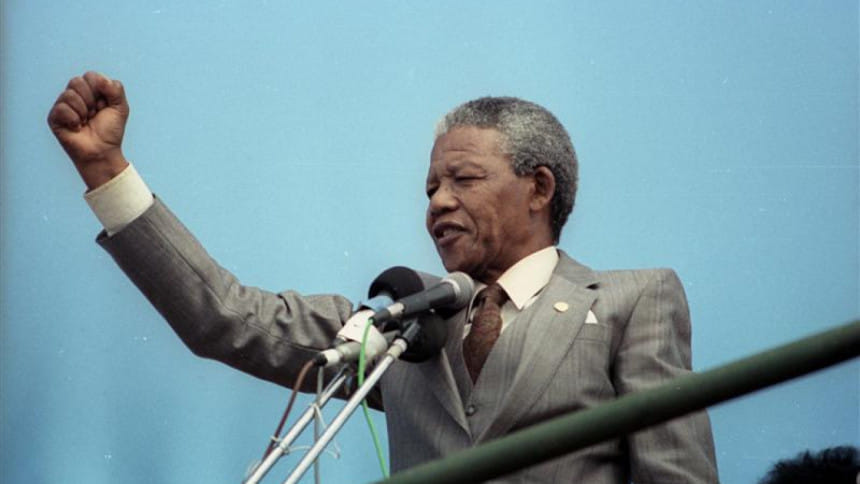He exemplified the power of resistance against oppression

"I learnt that courage was not the absence of fear, but the triumph over it. The brave man is not he who does not feel afraid, but he who conquers that fear," Nelson Mandela, a beacon of resilience and fortitude, once said. Every year on July 18, people around the world come together to commemorate Mandela Day and pay homage to the remarkable life and enduring legacy of Nelson Mandela. This celebration serves as a clarion call for us to reflect upon Mandela's timeless values and principles, and to proactively make a positive impact within our own communities.
In November 2009, the United Nations officially designated this day as UN Mandela Day. The day's central focus is honouring Madiba's memory by engaging in community service and promoting sustainable projects that leave a lasting imprint. But Mandela Day transcends being merely a commemoration of Madiba's life and legacy; it has evolved into a formidable global movement dedicated to honouring his life's work and fostering positive change on a global scale.
In an era where inequality continues to proliferate in society, particularly in vulnerable communities, Mandela Day assumes even greater significance. The power lies in recognising the needs of those around us, taking action, and making a tangible difference in their lives.
Year after year, we celebrate this day to illuminate the impact of a man who indubitably transformed the course of the 20th century, leaving an indelible imprint on the 21st. This occasion provides an opportunity for all of us to rekindle our connection with the values that inspired Nelson Mandela: unyielding determination, an unwavering commitment to justice, the safeguarding of human rights and fundamental freedoms, and an unwavering belief in the equality and dignity of every individual. Nelson Mandela's enduring legacy endows him with the status of a great statesman and an unwavering advocate for equality – the architect of peace in South Africa.
During tumultuous times, Nelson Mandela exemplifies the power of resistance against oppression, the triumph of justice over inequality, the supremacy of dignity over humiliation, and the healing force of forgiveness over hatred. As our world forges ahead with the 2030 Agenda for Sustainable Development, striving to overcome new adversities, we must remember the invaluable lessons imparted by Mandela's extraordinary life and the unwavering humanism that guided him. As he famously proclaimed, "To be free is not merely to cast off one's chains, but to live in a way that respects and enhances the freedom of others."
Nelson Mandela was born on July 18, 1918, in Transkei, South Africa. Hailing from the Thembu royal family in Mvezo, South Africa, he pursued a legal education at the University of Fort Hare and the University of Witwatersrand, eventually practising law in Johannesburg. It was there that he immersed himself in anti-colonial and African nationalist politics, emerging as one of the most prominent anti-Apartheid activists in South Africa. In 1963, he was imprisoned for his leadership role in the liberation movement against Apartheid and his unwavering commitment to the inherent right of individuals to live in freedom.
Assigned the prisoner number 466 in 1964, Nelson Mandela was confined to Robben Island, situated off the coast of Cape Town. Within the walls of Robben Island, prisoners were known not by their names, but by their numbers and the year of their imprisonment – thus, 46664 became Nelson Mandela's defining identifier. His eventual release in 1990 became a turning point in South Africa's political landscape, fuelling crucial debates and catalysing the country's transformation into a multi-racial democracy.
Following his release, Nelson Mandela continued to champion racial reconciliation in his country and supported initiatives aimed at healing a divided nation. In recognition of his tireless efforts, he was elected as South Africa's president in 1994, serving until 1999. Furthermore, in 1993, he was awarded the Nobel Peace Prize alongside former South African president Frederik Willem de Klerk. Mandela's post-presidency endeavours led to the formation of the Elders in 2007, an independent group comprising global leaders who leverage their wisdom and experience to advance peace, alleviate human suffering, and champion the shared interests of humanity.
Even before assuming the presidency, Mandela was deeply entrenched in anti-Apartheid activities. In 1962, he was arrested and imprisoned, and following the Rivonia Trial, he received a life sentence for his involvement in plotting the overthrow of the state. Over the course of his 27-year confinement, Mandela endured hardships in various prisons, including Robben Island, Pollsmoor Prison, and Victor Verster Prison. Despite such adversities, he remained unwavering in his commitment to the cause of freedom, spending many of those years alongside fellow freedom fighters.
Even in his official retirement, Nelson Mandela continued to lend his voice to pressing humanitarian issues and campaigned tirelessly for peace, children's rights, and the fight against HIV/AIDS.
Nelson Mandela was the recipient of more than 260 awards throughout his lifetime, and numerous statues and civic tributes have been erected in his honour, such as the one at Nelson Mandela Square in Johannesburg, South Africa. Over the years, postage stamps and various musical tributes have also been dedicated to Mandela, serving as enduring reminders of his immense contributions.
On December 5, 2013, Nelson Mandela, the first president of South Africa to be elected through a fully representative democratic process and the country's first Black head of state, passed away at the age of 95. His departure marked the end of an era, but his spirit lives on as eternal inspiration for the generations to come.
Sayeeda Fatima is a quality assurance analyst based in Canada.

 For all latest news, follow The Daily Star's Google News channel.
For all latest news, follow The Daily Star's Google News channel. 








Comments